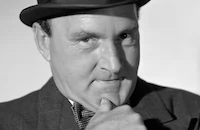The Alphabet Murders

Brief Synopsis
Cast & Crew
Frank Tashlin
Tony Randall
Anita Ekberg
Robert Morley
Maurice Denham
Guy Rolfe
Film Details
Technical Specs

Synopsis
Hercule Poirot, the famous Belgian detective, learns that British Intelligence has assigned one of their men, Hastings, to follow him while he is in London visiting his tailor. Poirot seems to attract crime, and while in London, an aquaclown, Albert Aachen, is found murdered in a swimming pool. Killed by a poisoned dart, Aachen's body is found by police next to a copy of the A. B. C. guide to London. While Poirot and Hastings enjoy a Turkish bath, Amanda Beatrice Cross enters in a frenzy and declares that she is a compulsive murderer; then she vanishes, leaving behind a handbag bearing the initials A. B. C. and a bowling alley score card. Poirot's investigation leads him to Betty Barnard, a bowling instructress who is murdered shortly afterwards, again by a poisoned dart. Since the first two victims had the initials A. A. and B. B., Poirot deduces that the next victim will be C. C., and further inquiries convince him that the killer will strike Sir Carmichael Clarke. Inspector Japp believes the case is solved when Amanda Cross is cornered on a high crane and jumps into the Thames. Poirot, however, continues to investigate and finally proves that Amanda did not perish in her plunge. A schizophrenic, she committed the murders because of her obsession with the alphabet.

Director
Frank Tashlin
Cast

Tony Randall

Anita Ekberg

Robert Morley

Maurice Denham

Guy Rolfe
Sheila Allen
James Villiers
Julian Glover
Grazina Frame
Clive Morton
Cyril Luckham

Richard Wattis
David Lodge
Patrick Newell
Austin Trevor

Alison Seebohm
Windsor Davies
Sheila Reid

Margaret Rutherford
Stringer Davis
Crew
Hardy Amies
Bill Andrews
Ben Arbeid
Lawrence P. Bachmann
Albert Becket
Bill Creed
Desmond Dickinson
Brian Fahey
Sash Fisher
Harry Gillam
Ron Goodwin
Norman Newell
David Pursall
Jack Seddon
John Victor Smith
David Tomblin
Fred Turtle
A. W. Watkins
Jake Wright

Videos
Movie Clip



Film Details
Technical Specs

Articles
The Alphabet Murders -
By Richard Harland Smith

The Alphabet Murders -
Quotes
Trivia
Notes
Released in Great Britain in July 1966; running time: 85 min. Working titles: Amanda and The ABC Murders.

Miscellaneous Notes
Released in England July 1966
Released in United States December 21, 1965
Released in United States March 2, 1966
Released in United States Spring March 2, 1966
b&w
Released in United States March 2, 1966
Released in United States Spring March 2, 1966
Released in United States December 21, 1965 (Pittsburg, Pennsylvania)













